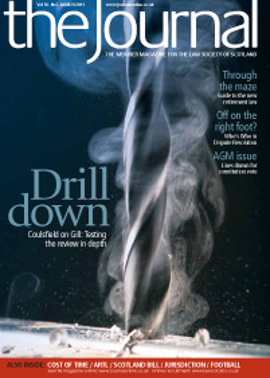Contaminated land - the story continues

Like death and taxes, the issue of contaminated land is forever with us. Interest in contaminated land goes up and down. The reality is, however, that the legacy of hundreds of years of industrial development in Scotland has not gone away and will not go away. The contamination is always there – lurking.
Most of the time contamination does not cause any difficulty. When things go wrong, however, they go very wrong. Property can be harmed. People can be harmed. The costs of cleanup can run into six or even seven figures.
The Law Society of Scotland has accordingly required to consider to what duties should be imposed on solicitors to advise with respect to contaminated land issues. The original advice, issued in April 2003 (can be viewed at www.journalonline.co.uk/ magazine/48-4/1000481.aspx). In very brief summary, this states that in every transaction, solicitors should consider whether contamination is an issue. It specifically states that in purchases, heritable securities and leases, solicitors should address the issue of advising the client in relation to (1) potential liabilities associated with contaminated land, taking into account the client’s own knowledge and expertise; and (2) raising specific observations with the sellers at least if a substantive response is likely. Thereafter, the guidance goes into greater detail regarding exactly what solicitors should do. It was confirmed in the Journal (December 2010, 57) that that guidance had been revised. That revision is relatively brief and can be reproduced in full here:
“The Society’s Professional Practice and Conveyancing Committees have reconsidered [the guidance of April 2003] in the light of the complexity of this area and the availability of specialist advice from Scottish solicitors accredited in environmental law. The committees’ view is that if a Scottish solicitor does not feel qualified to comment regarding environmental matters, whether in general and/or in particular in regard to contaminated land matters, then, whatever the nature of the property and the transaction (including for the avoidance of doubt both residential and commercial property), that solicitor is entitled to seek to exclude liability for environmental law matters and/or contaminated land matters provided that exclusion of indemnity is made clear in the initial terms of business issued to the client with respect to the transaction in question.”
So where are we? The basic position remains as per the guidance of April 2003: i.e., if a solicitor does not exclude liability for environmental law matters and/or contaminated land matters in the initial terms of business issued to the client then that solicitor is obliged to provide advice regarding contaminated land matters as per the guidance of April 2003. If that solicitor does not feel qualified to comment regarding environmental matters and/or contaminated land matters then that solicitor is entitled to exclude responsibility for environmental law matters and/or contaminated land matters by so doing in the initial terms of business issued to the client. As a risk management exercise generally, solicitors are always recommended to set out the scope of the services they intend to provide – or exclude – in as much detail as is reasonable in their terms of business or letter of engagement.
There is a group of Society-accredited specialists in environmental law ready, willing and able to help. If solicitors do not feel qualified to comment regarding environmental matters, whether in general and/or in particular in regard to contaminated land matters, they should exclude liability for those matters in the initial terms of business. Specialist advice is available to ensure that good service can still be provided to clients.
The one thing which solicitors cannot do is ignore the issue. If they say nothing about contaminated land in their initial terms of business then they will require to advise clients regarding contaminated land as set out in the April 2003 guidance.
In this issue
- The case for full disclosure of laboratory case files
- Why join the Scottish Family Law Association?
- Above board
- Time to be counted
- Taking out rejections
- Updating the constitution
- Every bit helps
- Retiring the default age
- Keeping a grip on cash
- Watch this space
- The diehards
- Win-win ways
- "Virtual fair" opens for career options
- Law reform update
- Society's in-house work under scrutiny
- Watching over the constitution
- All aboard life's U-bend
- Ask Ash
- Working to advantage
- Frauds and scams beware
- Lay help... official
- Lacuna manufacturing
- This time it's NOT personal
- Fairness and trust
- Pensions: redefining value
- Sharing the spoils
- World IP Day 2011 approaches
- Life v reputation
- Book reviews
- ARTL, by degrees
- Contaminated land - the story continues






